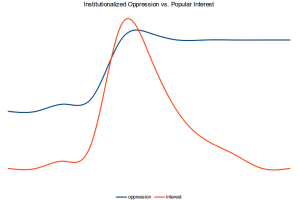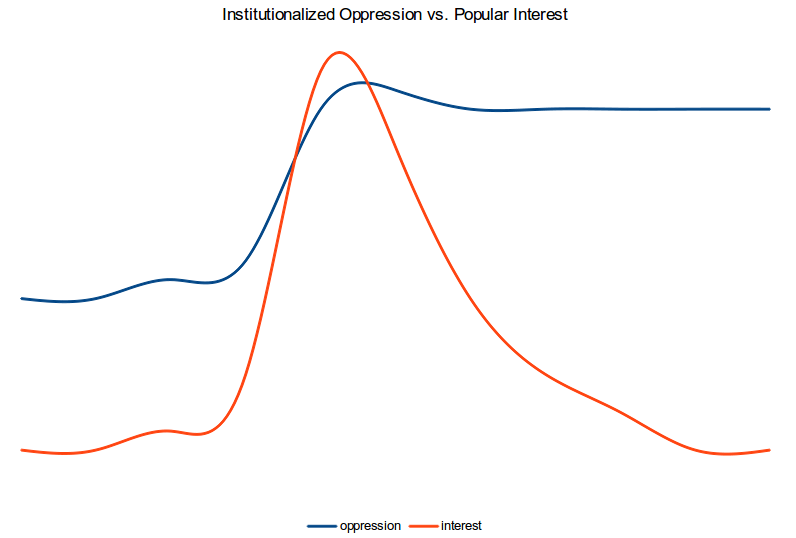The company I work for has an employee assistance program through its insurance policy. It’s a self-help website with material focused around health and well-being.
A year and some ago, I approached them about their stuff on queer and trans issues. It was just a mess. In particular, their articles touching trans issues were so bad as to risk causing harm if consulted. The worst of the bunch was one called Transexuality, transgenderism and sexual identity.
There was silence, and I contacted them again in February of this year. In the months since, there has been some back and forth. I explained to them a few times why the information was offensive and harmful. They would thank me, give me some details that helped elucidate matters from their end, and promise updates.
Well, the changes finally came through. They removed all articles pertaining to queer issues except for two, one being an updated version of the cited problem article. The article meanwhile was reduced by two thirds, definitions were plagiarized from a better website, and the rest of the content was reworded.
It was clear to me that no one with experience in trans issues was involved in the writing of these articles. Through our communication I learned that they didn’t always vet articles by experts, and that this article was put together by a copywriter. I offered them resources to professionals, but they never took me up on that.
So I’ll post the original and revised articles below, and go into what was so bad about the original one, and what changed with the revised version.
The Original Article
Transexuality, transgenderism and sexual identity
Overview
Understanding transexuality, transgenderism and sexual identity
- Basic terms and definitions
- Sexual orientation and gender
- Sexual orientation and transgenderism
- Supporting a transgendered or transsexual co-worker
The difference between transexuality, transgenderism, and sexual orientation can be confusing. It’s important, therefore, to understand the differences in order to fully understand the need for some people to bring their external appearance into line with their internal gender identity.
Let’s begin by examining the basic terms and definitions surrounding the subject.
Basic terms and definitions
- Gender. How society, biology, or culture defines “male” and “female.”
- Gender identity. How an individual defines his or her gender.
- Gender role. Rules assigned by society that define what clothing, behaviours, thoughts, feelings, relationships, etc. are considered appropriate and inappropriate for members of a given gender. Classifications of “masculine,” “feminine,” or “unisex” vary by class, culture, location, occasion, as well as other factors
- Transgender. An individual who defines his or her gender identity as opposite from his or her biological identity at birth. For example, a man who was born with male genitalia and identifies his gender as “female” or vice versa.
- Transexual. Similar to transgendered, a transsexual associates him or herself with a gender identity opposite from his or her biological identity at birth, but undergoes sexual reassignment surgery to change gender. An example is the 1970s tennis star Dr. Richard Raskind who was born “male” but felt “female.” He underwent sexual reassignment surgery to become physically female — Dr. Renee Richards. Other notable transsexual people include photographer Christine Jorgenson (born George William Jorgenson Jr.), writer Jan Morris (born James Morris) and musician Wendy (born Walter) Carlos
- RLT. Stands for Real Life Training and means a transgendered individual wishing to undergo sexual reassignment surgery must live as the member of their preferred sex for a period of time prior to having surgery.
- SRS. Sex Reassignment Surgery. After successfully completing the RLT stage, a transgendered person completes the final stage in aligning his or her internal and external gender.
Sexual orientation and gender
According to the Kinsey Reports, sexuality is not a fixed state and is prone to change over time. Instead of three categories (heterosexual, bisexual, and homosexual), the Kinsey Report used a eight-category system. The Kinsey scale ranked sexual behaviour from 0 to 6, with 0 being completely heterosexual and 6 completely homosexual. A 1 is considered predominantly heterosexual and only incidentally homosexual, a 2 mostly heterosexual and more than incidentally homosexual, a 3 equally homosexual and heterosexual, and so on. An additional category X was created for those who experienced no sexual desire. The majority of us land on the heterosexual side of the scale, while one in 10 will identify as homosexual. In between are those who identify as bisexual.
Simply put, sexual orientation refers to the gender to which we are sexually attracted.
Gender, on the other hand, is the physical appearance and internal wiring that makes us either male or female. Unfortunately, nature sometimes doesn’t align our internal wiring with our external appearance. The result is someone who experiences a disconnection between his or her inside sense of self and gender and external, physical characteristics. The physical package may say male but their sense of self may say female or vice versa. These people are labelled as being “transgendered”
Sexual orientation and transgenderism
It is important to separate sexual orientation from transgenderism. Sexual orientation is the direction of our sexual interest – our sexual attraction to members of the opposite sex, the same sex, or both sexes. Transgenderism has nothing to do with the choice of sex partner.
For example, a transgendered male attracted to females will still be attracted to females after sexual reassignment surgery. He will go from being described as a straight male to a lesbian female. Consequently, a male attracted to males will continue to be attracted to males following sexual reassignment surgery and will go from being described as a gay man to a straight woman.
This may be a little confusing but if we keep in mind that orientation is about whom we are sexually attracted to, gender is how our individual physical and internal wiring dictates whether we are male or female, and that gender role is how we appear physically externally, then we can begin to better understand the issue. We can then see that transgenderism and transexuality is merely correcting a disconnect between the external appearance and internal self.
Most transsexual people will only feel whole when their internal self matches their external appearance.
Supporting a transgendered or transsexual co-worker
It can be confusing when a person with whom we have worked begins to transform into the opposite gender. Often ignorance and myth are the cause of much fear, anxiety and discrimination. We are, after all, human, and humans generally fear the unknown. Sometimes we feel tricked by the transgendered person, believing that he or she has betrayed us by keeping such an important secret.
Some of us may fear that a colleague’s gender change will result in a change in sexual orientation and that we may become targets of the transgendered person’s affection. Many of us are afraid we’ll say or do something that will result in a distancing from a person to whom we were once close. In some ways we are grieving the loss of someone we knew and are having to get reacquainted with that person all over again.
All of these reactions are normal.
Co-workers and friends of a transgendered individual need to keep in mind that sexual reassignment is not a decision anyone makes lightly. It is difficult and requires courage. It’s important to understand that while your transgendered colleague’s outward appearance may be changing, he or she remains the same inside. He or she has the same personality, the same sense of humour, the same professional skills and qualifications. If we care about that person, we need to respect his or her decision and understand that this isn’t about making a statement, but rather about feeling a complete – and correct – human being.
It is also important to respect our co-worker’s right to privacy as he or she makes the transition. We can ask questions, but the most important one is “Is it okay for me to ask about the process?” Don’t ignore what is happening. For a transgendered person, ignoring this life affirming change will result in him or her feeling as though you either don’t care or that you have a problem with the situation.
Don’t be afraid of being awkward. It’s normal to feel a little awkward when we are presented with a new situation. Be respectful, be supportive, remain interested, and your colleague’s transformation may just change your life as well.
What’s So Wrong With The Original?
Let’s start with the fact that they get the gendering and pronouns wrong. Let me just say that a woman is a woman, irrespective of any medical history. Irrespective of outward appearance. Irrespective of genital configuration. She is a woman if she says she’s a woman.
This article starts to get things wrong starting right with the definitions. For “transgender”, they say “For example, a man who was born with male genitalia and identifies his gender as ‘female’ or vice versa.”
They’re describing a woman. Yet they call her “a man”, use the pronouns “his”, and put “female” in quotation marks. Everything about this says that they don’t really think she’s a woman. She’s a man. Using the wrong pronouns alone can be very hurtful when dealing with someone, but this takes it a step beyond. This is not a good start to get people with no exposure in the right mindset.
The next set of examples, in the definition for “transexual”, are equally bad:
An example is the 1970s tennis star Dr. Richard Raskind who was born “male” but felt “female.” He underwent sexual reassignment surgery to become physically female — Dr. Renee Richards. Other notable transsexual people include photographer Christine Jorgenson (born George William Jorgenson Jr.), writer Jan Morris (born James Morris) and musician Wendy (born Walter) Carlos
Again, everything here serves to de-legitimise the person’s gender identity. The tennis star is not referred to by her actual name, but by her masculine birth name. It says that she “felt” female, and that “he” (wrong pronoun) underwent surgery to become “physically” female. Again and again, a denial of her womanhood.
Then it goes on to cite other examples of famous trans people, feeling it necessary to put their birth names there. Tip: don’t bring up people’s birth names – ever – unless they gave you explicit permission to do so.
They go on to define “real life training”, which ignores the reality that every day is real life training. It’s rooted in an antiquated approach by the medical establishment to dealing with trans people. It’s also based on very strict gender roles for what a “man” or “woman” ought to dress and behave like.
Finally, it’s the definition for sexual reassignment surgery (SRS), which they call “the final stage in aligning his or her internal and external gender.” Which is of course just plain wrong. Some people will go through SRS. Some won’t ever. But the identity of both are equally just as valid.
You are more than just your genitals. Something that this article gets wrong time after time.
After definitions, the article discusses orientation. They mean to say that sexual orientation and gender are independent. That’s a good message. However, they do so invoking the Kinsey scale and bringing up the long disproved statistic that 1-in-10 people are gay. Whatever though.
What’s troubling are their examples in this section, where they get it all wrong:
For example, a transgendered male attracted to females will still be attracted to females after sexual reassignment surgery. He will go from being described as a straight male to a lesbian female. Consequently, a male attracted to males will continue to be attracted to males following sexual reassignment surgery and will go from being described as a gay man to a straight woman.
With the first example, what they mean to say is that a trans woman attracted to women will still be attracted to women. She will go from being described as a lesbian woman to a lesbian woman.
Let’s unpack this first example, because the subtext is what’s quite harmful. First off, remember that a woman is a woman. If you put “trans” in front of it, she’s still a woman. But they call her a “transgendered male” because the person was likely assigned male at birth. And according to whoever wrote this article, what makes the difference is your genitals – notice how she wasn’t recognized as a lesbian woman until after she had SRS?
This example gets the definition for trans man/woman reversed, and their gender identity isn’t respected until “the surgery.” That’s a really harmful message to propagate, because it suggests that all those men and women aren’t there aren’t real unless we can peek down their pants.
But that’s not the worse of it. That comes in the next section on support:
It can be confusing when a person with whom we have worked begins to transform into the opposite gender. Often ignorance and myth are the cause of much fear, anxiety and discrimination. We are, after all, human, and humans generally fear the unknown. Sometimes we feel tricked by the transgendered person, believing that he or she has betrayed us by keeping such an important secret.
Some of us may fear that a colleague’s gender change will result in a change in sexual orientation and that we may become targets of the transgendered person’s affection.
…
All of these reactions are normal.
These reactions are not okay. Again let’s unpack.
The article says that fear and ignorance drive discrimination, but then justifies it with “we are, after all, human.” They say that it’s a normal reaction to feel “tricked” and “betrayed” by a trans person for being themselves.
The more disturbing one is the expressed “fear” that we could be the “targets of the transgendered person’s affection.” Why is this even in there at all? And why the use of the words “fear” and “target”? Oh, because the affection of a person isn’t the same if they have a trans background. Right.
This article normalizes hostile behaviour towards trans people (“we are, after all, human”). It uses language like “fear”, “target”, “tricked”, “betrayed” when discussing a trans person for just existing. This is what makes this article harmful. It’s subtle – look at the vocabulary used – but it promotes a way to frame the issue that’s hurtful for trans folk.
The messaging towards the end of the article gets better. It states that people are still the same they’ve always been. That’s important. But it also screws is up once again. It equates being trans with surgery – perpetuating the destructive idea that it’s your genitals are what legitimises your identity.
We can ask questions, but the most important one is “Is it okay for me to ask about the process?”
I totally agree, consent is important. But get away from this obsession with “the process” – which given the wording is really is another way to talk about genitals. How about just asking them how they’re doing? Furthermore, different people would be quite content not to be reminded how they’re seen as different all the time.
Like some people might want to talk about it, which is totally cool. But bringing up intimate details about someone’s body, especially in a work situation like this article, I don’t think makes for a welcoming environment. Do you really want to go to work to be asked about your genitals even in a polite way?
Don’t ignore what is happening. For a transgendered person, ignoring this life affirming change will result in him or her feeling as though you either don’t care or that you have a problem with the situation.
Actually, there’s absolutely nothing wrong with treating the person as you always have, new name and pronouns aside. In fact, that might be pretty fucking desirable. Depends on the person. It’s not a sign that you don’t care or have a problem, it could be the very opposite. Pretty sweeping assumption though, well done article author.
So yeah, just a terrible piece of work. I mean the intent is to have people be more supportive of trans people in their workplace, but instead they get told that trans people’s identities are reduced to genitalia, that they aren’t really that identity anyways, that it’s normal to fear them being attracted to you, etc.
On to the revised version.
The Revised Article
Showing Respect for Transgender or Transsexual Co-workers
Overview
Understanding and showing respect for transgender or transsexual co-workers, colleagues or business associates.
- Basic terms and definitions
- How you may feel when you learn that you have a transgender or transsexual co-worker
- Ways to show respect for transgender or transsexual co-workers
Basic terms and definitions
The term LGBT is widely used for people who are lesbian, gay, bisexual or transgender, but each of those groups is unique. Here are some definitions to keep in mind:
- Lesbian, gay and bisexual are words to describe a person’s sexual orientation – a term that indicates whether someone is attracted to the same sex, the opposite sex or both.
- Transgender refers to gender identity, and not to sexual orientation . Gender identity is the sex that a person identifies with on a deep psychological level, whether or not his or her birth certificate reflects it. It is “an umbrella term for people whose gender identity and/or gender expression differs from the sex they were assigned at birth,” according to the Lesbian, Gay, Bisexual and Transgender Community Center (www.gaycenter.org). “The term may include but is not limited to transsexuals, cross-dressers, and other gender-variant people. Transgender people may identify as female-to-male (FTM) or male-to-female (MTF).” A transgender person can be straight, gay or bisexual.
- Transsexual is an older term that refers to someone who identifies as a member of the opposite gender and who, through surgery or hormone therapy or both, acquires physical characteristics of that gender. The Lesbian, Gay, Bisexual and Transgender Community Center says that many people who have had surgery or hormone therapy call themselves transgender rather than transsexual.“However, unlike transgender, the term transsexual is not an umbrella term, and many transgender people do not identity as transsexual.”
At work and elsewhere, it’s best to use the term the person prefers. Avoid using the term “transgender lifestyle.” Transgender adults have many lifestyles, just as others do.
Many transgender people have gender reassignment surgery (SRS), the term preferred to “sex-change operation.” But, not everyone wants or can afford to have the surgery, and not having it doesn’t make gender identity less important to the person.
How you may feel when you learn that you have transgender co-worker
It can be confusing when a person whom with you have worked for some time – and particularly if you know him or her well – begins to take on a new gender identity. If this happens, you may:
- Feel hurt or even betrayed that the person kept an important secret from you.
- Wonder if you will become the object of the person’s affection.
- Worry that you will say or do something that will result in a distancing from a person to whom you were once close.
All of these reactions are normal. In some ways, you may be mourning the loss of the person you knew, and feeling as though you need to reacquaint with that person all over again.
Showing respect for transgender co-workers
If your transgender co-worker has made the decision to go through the process of gender reassignment, here are some important things to remember:
- Keep in mind that sexual reassignment is not a decision anyone makes lightly. It is difficult and requires courage.
- Remember that while your co-worker’s outward appearance may be changing, other aspects of their personhood aren’t.Your colleague has the same personality, the same sense of humour, the same professional skills and qualifications. In order to maintain a good relationship, you will need to respect his or her decision and understand that this isn’t about making a statement, but rather about feeling a complete and correct human being.
- Respect your co-worker’s right to privacy as he or she makes the transition, but don’t ignore what is happening. Ignoring this life-affirming change may make the person feel as though you either don’t care or that you have a problem with the situation. If you aren’t sure what to say, you might simply ask your colleague, “Is it OK for me to ask about the process?”
You may also want to visit the website for PFLAG (Parents, Families and Friends of Lesbians and Gays Canada – www.pflagcanada.ca),which has an extensive section of transgender resources that can help you understand your colleague’s experience and possibly even the changes that he or she may be experiencing.
Don’t be afraid to feel awkward. It’s normal to feel unsure of how to act when a new situation arises. Be respectful, be supportive, remain interested, and your colleague’s transformation may just change your life as well.
So… Better?
The title sets the right tone, with “Showing Respect for Transgender or Transexual Co-workers.”
The definitions this time round are actually okay. It helps that they copied-and-pasted parts of them from better websites. Gone is the incorrect gendering and the use of surgery as what validates your identity. In fact, there’s now a paragraph about how surgery isn’t the arbiter of identity. The definitions could stand to be improved (there are more orientations than just straight/gay/bi), but it’s a big step up from before.
Justification for discrimination, and words like “tricked”, “fear”, and “target” have all been removed. That’s good. What’s less good is that the gay panic shit remains, albeit reworded in less strong language (you may “wonder if you will become the object of the person’s affection.”) That should just be removed entirely.
Because much of the revised article is rewording of the original, the association between surgery and identity still remains in spots. There’s still that suggestion of what many would associate with asking questions about their genitals in a work setting (“Is it OK for me to ask about the process?”)
The revised article concludes by suggestion the reader visit PFLAG’s website. So overall, the new article is better. It’s not a very useful article, given that their approach to making it acceptable was to cut, copy, reword – rather than write something decent from scratch. But better that than the original, which was spreading really terrible ways to look at trans matters.





































